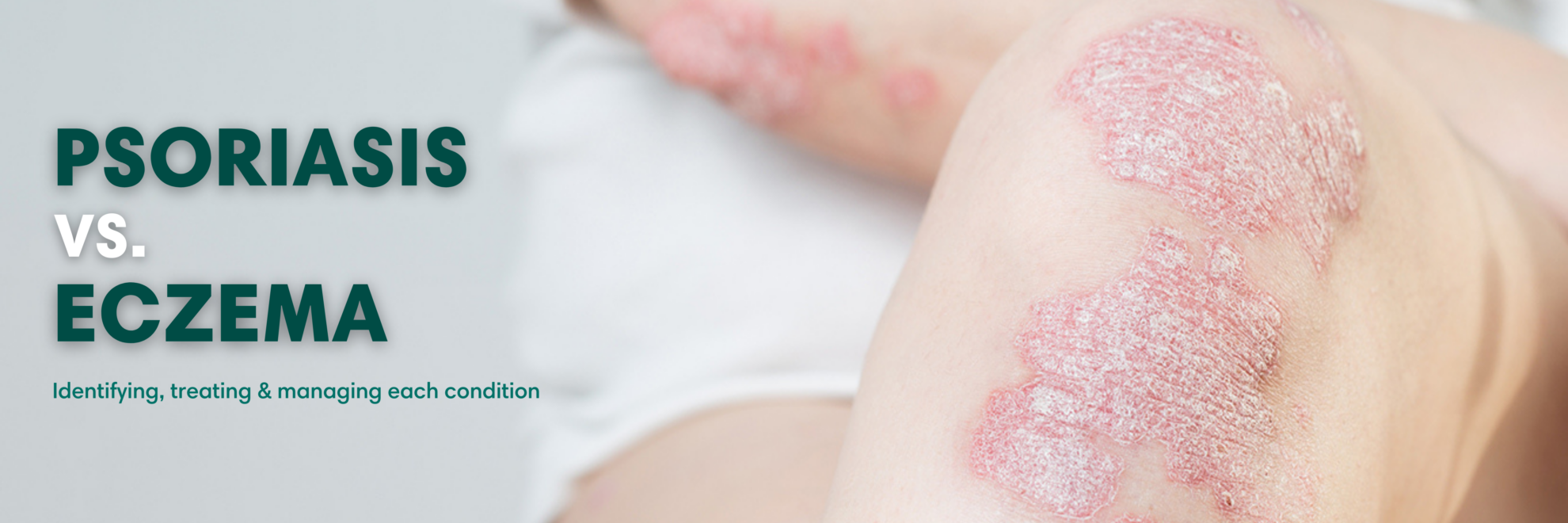
If you have itchy, red, flaky, or burning skin that never seems to get any better, you may have eczema or psoriasis, two of the most common skin conditions. It’s important to see your dermatologist for a clear diagnosis as eczema and psoriasis can manifest differently from one person to the next.
What is Eczema?
Eczema is a type of dermatitis that is caused by an issue with the skin’s outer layer, lead to symptoms of dryness, itch, redness, and skin texture changes.
There are 7 different types of eczema. Each type manifests differently, and depending on which type you have, the treatment plan may vary too. Here’s a quick rundown of eczema types:
- Atopic Dermatitis (AD): The most common type of eczema. Most commonly appears on the hands or around the eyes as dry, patchy, or scaly skin.
- Contact Dermatitis: Occurs when a skin irritant triggers an itchy reaction.
- Dyshidrotic Eczema: Caused by an allergen and manifests as tiny, highly itchy blisters on the hands and feet.
- Hand Eczema: Causes dry, painful cracks on the hands accompanied by extremely dry or chapped skin.
- Neurodermatitis: Highly common in adults and tends to affect only one or two areas of the body with dry, itchy patches.
- Nummular Eczema: Typically brought on by very dry skin, this type can look similar to atopic dermatitis or ringworm.
- Stasis Dermatitis: Primarily affecting the lower legs and feet, this type is caused by chronic edema or swelling and results in inflammation, itchiness, scaling, and hyperpigmentation.
Changes in Climate
Eczema flare-ups can be brought on by exposure to an allergen, or skin irritation from sweat, sun exposure, or stress. Your dermatologist can help you identify what might be causing your eczema, and devise a treatment plan that can reduce the severity and frequency of flare-ups.
What is Psoriasis?
Psoriasis is a chronic skin disease that is most often found on the knees, elbows, or scalp. It is thought to be caused by an overactive immune system in which the growth of skin cells occurs very quickly; instead of shedding, they pile up on the skin’s surface and create irritation.
In most cases, psoriasis is characterized by raised areas called plaques on the skin that are typically red, itchy, and can burn or sting. It is a lifelong disease, but it can be managed with the right treatment plan.
There are 5 primary types of psoriasis:
- Plaque Psoriasis: This most common type manifests as raised patches of skin called plaques, which are itchy, red, inflamed, and often appear to have silvery scales.
- Inverse Psoriasis: Most commonly identified by the lack of scales on the skin that are so common with plaque psoriasis. It is most often found within skin folds.
- Guttate Psoriasis: Typically manifests as small red spots, and is frequently found on the arms, legs, chest, stomach, or back.
- Pustular Psoriasis: Characterized by pus-filled bumps that are painful and irritated. Most commonly found on the hands and feet, but can appear on any area of the body.
- Erythrodermic Psoriasis: Very rarely, individuals with psoriasis may develop redness and excessive shedding of skin layers, which can become severe.
Psoriasis can cause significant discomfort but can be controlled through a skincare routine developed between you and your dermatologist.
Think You Have Psoriasis or Eczema? Have a Dermatologist Take a Look.
Psoriasis and eczema are very common skin conditions that cause red, itchy, and sometimes flaky patches. They can look and feel very similar so if you have any of these symptoms, see your dermatologist for proper diagnosis and treatment.
Schedule an appointment today with an expert provider to begin your path to healthy skin.